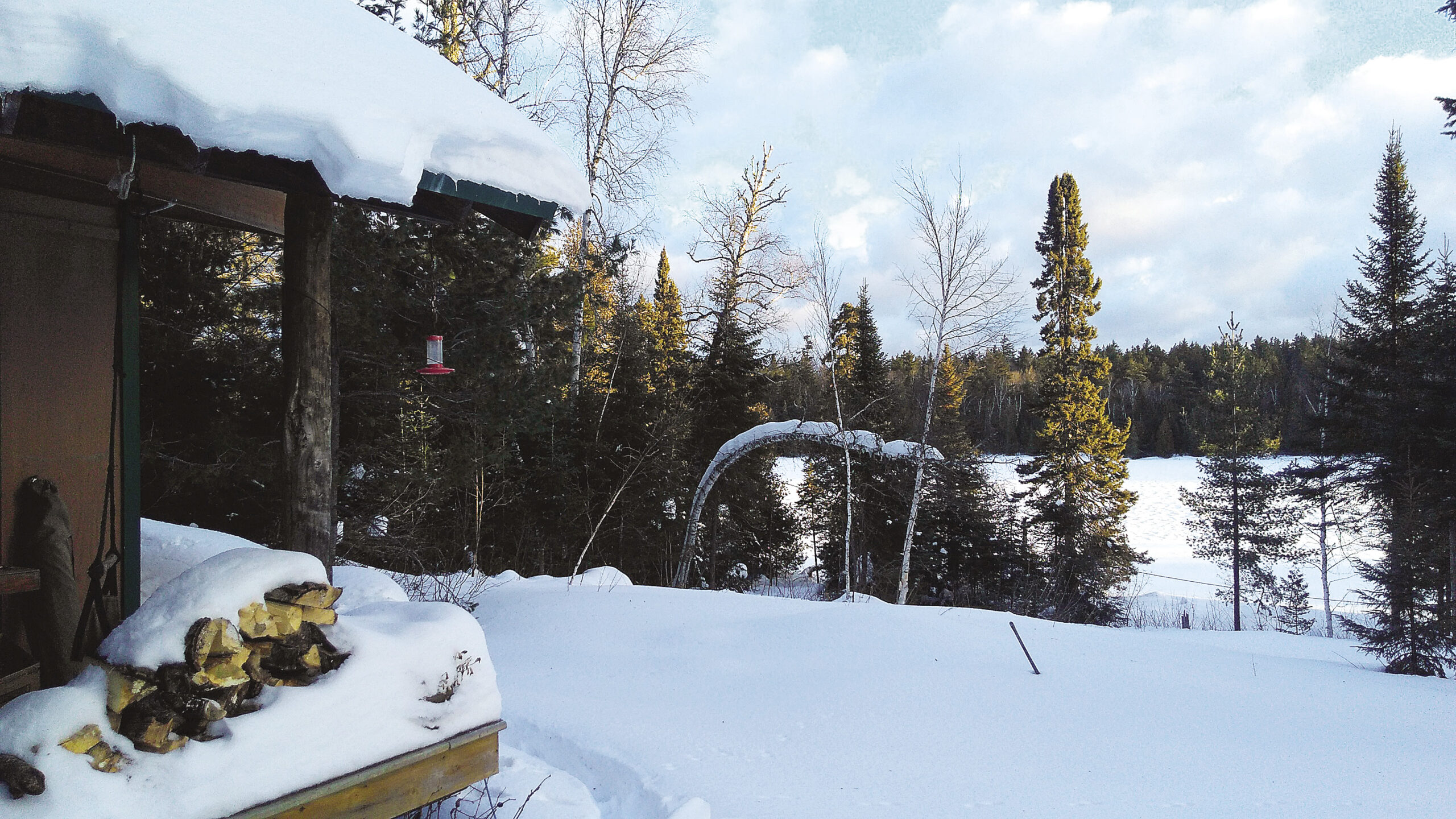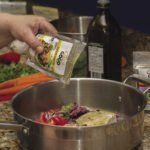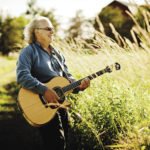My husband Matt and I moved to Cook County almost four years ago, with 25 sled dogs, three vehicles, a storage shed full of belongings and nowhere to call home. We felt we had perused the real estate listings enough to see that there were plenty of properties to buy within our price range. When we put our feet on the ground and started physically going to the properties, we found everything in our price range was either on a really bad road, many miles from town, lacked all basic amenities, consisted of a dilapidated shack or had no structure on it at all. One property visit required the real estate agent to pull us from the mud on our way out—not a great sell.
It was not necessarily our dream to be living off grid, but it became apparent that living off grid was all we could afford, and we had the constraint of needing to buy a place that was on trails for mushing and in a sled dog-friendly neighborhood.
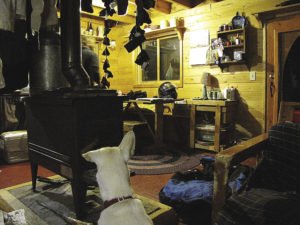
One day, I opened the paper and found a for sale by owner listing for a small cabin, sauna and wood shed on 40 acres on Mush Lake, a small and shallow lake tucked on the north side of Pine Mountain and in the hills above the Brule River. It sounded dreamy. The first time we tried to find the place, however, we found ourselves walking on a four-wheeler trail with no cabin in sight. Several weeks later, the owner brought us to the place, a full mile of rocky, rutted, wet trail that only an ATV or really heavy-duty truck could travel. But road aside, the place had charm—a 600-square foot cabin on a private lake, connected to snowmobile trails and forest roads that were perfect for training sled dogs.
To be honest, the ‘off grid’ part of the property didn’t faze us nearly as much as the ‘you can’t drive to the property’ part. We knew there would be challenges, but we decided to go for it. Our situation was becoming all the more urgent as we were living in a canvas tent, and it was October and already snowing; we were starting to get really cold. So we signed the purchase agreement and moved in mid-November, hauling everything we could by ATV and trailer.
Living off grid can be very comfortable. I have visited off grid homes that have every amenity—fully plumbed and wired. Our rustic abode has no well and we must haul in our water either from the lake or from town in five-gallon plastic containers that come in on the Otter sled. In the summer, we are able to pump lake water to an outside storage tank, but we still have to haul it into the house by hand. We have an outhouse. After living out of coolers for a period of time, we bought a used propane fridge. We have propane lights and a propane range and stove, but the cabin is also wired, so we are able to run a generator and run electric lights, many small appliances and best of all, a satellite internet system to keep us connected. We heat with wood cut from our property.
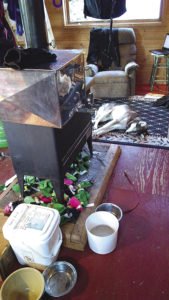
Our first winter at Mush Lake, we snowmobiled all the way out to the Gunflint Trail where we parked our cars. This was the winter of the polar vortex, when it was below zero every night and far below zero on many nights. Several times the snowmobile wouldn’t start and we had to walk three miles to get home.
Without any way to communicate with the outside world at first, we relied on planning. If I worked until 7 p.m., Matt would meet me at the Gunflint Trail with the snowmobile at 7:30 to give me a ride in. One night, when I didn’t show up because my car had died, he finally came driving toward town and we were able to find each other. When we hooked up the satellite internet and could email each other if the plans needed to change, it felt like we had catapulted ourselves into the modern century.
There were winter days you could have seen us snowmobiling toward town with socks and underwear falling into the snow behind the otter sled all the way down the trail. Other days you would have found us digging out the snowmobile from wherever one of us had managed to go off the hard pack and into the deep snow on the side, or out on the windswept lake, filling water containers from a hole in the ice to bring up to the house. We took saunas or showered in town.
We have hauled in building materials for two sheds by ATV and snowmobile. We rely on a snowmobile and ATV, chainsaw, wood splitter and generator. Sometimes, maintaining all these things—machines that we rely on every day—feels very complicated. It’s common for friends and family to romanticize what appears to be a simple life. It’s actually quite complex.
Don’t forget your car keys at home or it’s a long way back to retrieve them. Make sure there is back-up propane. Keep a gas container full at all times for the generator.
And yet, it is simple and so quiet. It’s a rare event that we have an unsolicited visitor—just the rare snowmobiler that gets onto our drive and off the Musquash Trail. Most of these folks turn around when they see a few dozen dogs barking in their direction. We have an entire lake to ourselves, that while too shallow to dive in from the dock, makes a great swimming spot in the summer if you paddle out to the middle. I have walked face-to-face with moose on our road, followed fresh wolf tracks down the trail, watched fox sitting outside the kitchen window, and otters swimming at the end of our dock. Walking in and out of our property to and from the car requires me to watch the flora change day-by-day. It also keeps me in shape. Our nearest neighbor is likely 10 miles away as the crow flies.
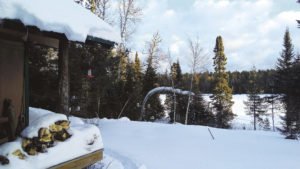
In the last year and a half, there have been some changes that make our situation not-so-difficult. We were able to improve the road into our property most of the way. There is a still an eight-minute walk, but that seems easy to me now. Of course, this also means we must plow our road all the way to the Gunflint Trail. Because of my husband’s job, we also have access to a caretaker house that affords us hot showers and laundry service.
I’ve gotten used to the things that make our life challenging, and there are moments I crave something easier—such as waking up on a cold winter morning to find the propane is out before I’ve made coffee, requiring me to find a large wrench to go change it. When the plow truck gets stuck, we are on our own to get it out. Someday, I think I’d like the road to go to my front door.
This spring we will be adding another member to our family. Some have asked me if we are really going to raise a child off grid. I don’t know how long we will live at Mush Lake, or maybe it will only be for part of the year. I do know that people have been raising babies off grid for thousands of years, so it is possible. And in Cook County, we certainly won’t be the first. Since our move to the North Shore, I have met some of the most self-reliant people the world can offer up, living all sorts of lifestyles that seem foreign to many.
I believe that those of us living here are in on the secret: It might be difficult, expensive and at times inconvenient, but living up north is definitely worth it.


